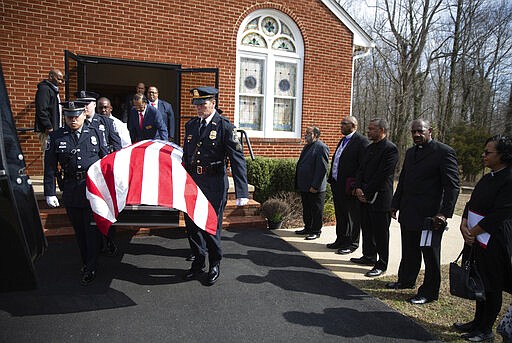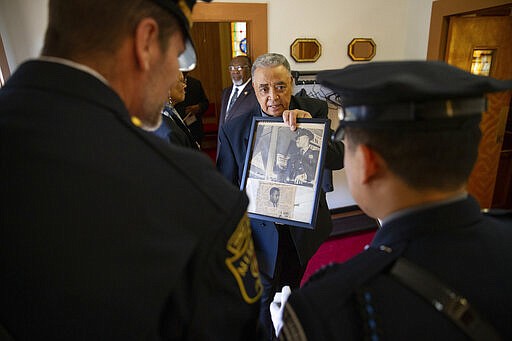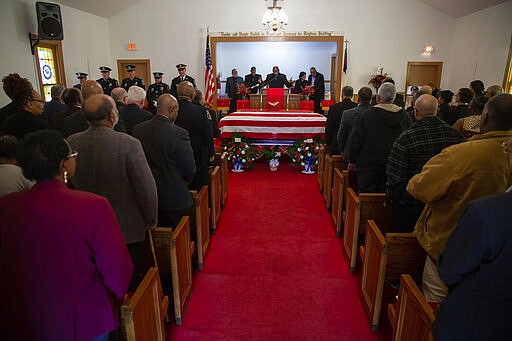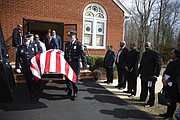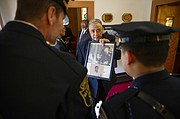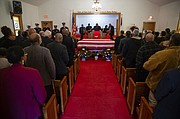'Our Jackie Robinson': Virginia city remembers police chief
ALEXANDRIA, Va. (AP) — They called him a trailblazer, an officer who treated others with respect — even when he got little in return — and the man who paved the way for other people of color at the Alexandria City Police Department.
“He was kind of like our Jackie Robinson,” Assistant Chief Don Hayes said about Albert A. Beverly, who in 1965 became the first African American policeman in Alexandria, as well as all of the Washington suburbs. “To all who want to follow the same example, the trailblazers are there because Al started it.”
Hayes was among uniformed officers and department retirees, as well as friends and family members, who paid tribute to Beverly during his funeral on March 2 at People’s Union Baptist Church in King George County. Beverly died in his home on Feb. 21. He was 78.
Born in King George, he returned to the county after 20 years with the Alexandria Police Department and spent another 17 years on the police force at the Navy base at Dahlgren.
The Alexandria police honor guard stood by his flag-draped casket during the church service, and uniformed officers were expected to join the family on March 3 for burial at Quantico National Cemetery.
The values Beverly applied to his job, and life, came from his upbringing in King George, where he spent time in the bricked church as a young trustee and choir member, said friend Charles Frazier. As he shared brief memories with others in the packed sanctuary, Frazier said it would take him all day to say all the good things he wanted to about the man everyone knew as Al.
“He was well-known,” said his sister, Lucy Beverly Johnson. “Whenever he came out of the house, he was always smiling, easy-going and polite and courteous to the women.”
Beverly’s granddaughter, Mikayla Feather, remembered weekly visits with her “Pop–Pop” that included big breakfasts and shopping. “I’m gonna miss him a lot,” she said. “He always made really good fried chicken.”
“The best,” echoed several in the audience.
But not everyone realized the impact Beverly made during what retired policeman Earl Cook called the turbulent times of the 1960s.
“There was a lot of unrest, and Al was a steady force,” Cook said.
As far back as 1953, the Alexandria City Council passed a resolution that prohibited discrimination in city government, but it took more than a decade for a black policeman to be hired, according to an exhibit on African Americans in Alexandria Public Safety.
Cook, who later became the city’s first black police chief, said he isn’t sure what led then-Chief Russell Hawes to select Beverly, a 24-year-old Air Force veteran. But Cook said he knew who led Beverly there.
“God sent Al in that direction,” he told those in the audience. “Al was strong, he had courage, and he was the best one to the lead the way.”
Richard Davis sat in the back pew, unable to say anything but “wow.” He knew Beverly, his cousin, had integrated the department, “but to hear it described that way was very powerful. Having that as part of your family history is really impactful.”
Retired Alexandria policeman Herman Springs said Beverly gave a lot of guidance to other black officers who later joined the department. He told them what to expect and how to handle tense situations.
“He was one of those guys who was easy-going, and he liked kids,” Springs said. “And he kept his car immaculate.”
Soon after Beverly was hired, he was quoted in a newspaper story as saying he wanted to focus on his work and be “treated like all the other rookies on the Alexandria police force.”
But it’s unlikely that many other newbies dealt with issues Beverly faced in those early days. Almarie Tompkins, his ex-wife and mother of his three children, said he “caught a lot of flak,” both from white families who didn’t want him on their property and black families who called him an “Uncle Tom and other derogatory stuff,” she said.
“People would sic their dogs on him, or he would go on calls, and they would tell the white officer with him to leave that ‘N’ at the door,” she recalled. “He used to tell me, ‘That’s why I have bleeding ulcers today, from all of the stress I went through.’ “
The Rev. Nancy Tucker, the cousin of Tompkins, said it’s never easy being the first. “There’s no manual for you to follow, and you have to set the example,” she said.
She believes the adversity he faced helped him develop integrity and courage, which he displayed “throughout his career and to the day of his passing.”
Hayes ended the remarks from friends and family with one of the Beatitudes.
“Blessed are the peacemakers, for they shall be called the children of God,” he said. “I think that’s what Al represented in his life and in his police work.”



